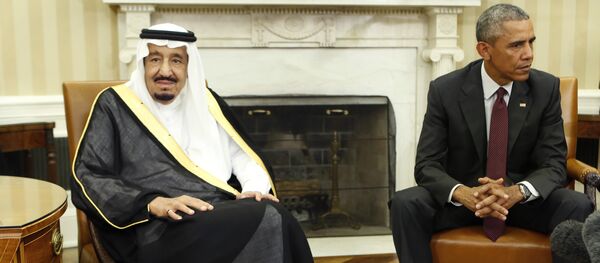A month ago, Saudi Arabia's Foreign Minister Adel Al-Jubeir threatened Washington, saying his country would sell off up to $750 billion in US Treasures and other assets, undermining the US economy, if a bill allowing families of 9/11 victims to sue the Saudis in a US Court passed in Congress.
Al-Jubeir's statement has prompted a lively debate on whether Saudi Arabia could really deal a heavy blow to the US dollar, or if its claims are nothing more than an idle threat.
"Should we [the US] worry about Saudi retaliation?" Chris Matthews of Fortune.com asked in an article that was published on April 19.
Although the US has been releasing data on foreign ownership of Treasuries on a regular basis since 1974, in accordance with a special agreement concluded between Riyadh and Washington following the Gulf nations' oil embargo of 1973, the amount the Saudis had in US Treasuries remained a closely-guarded secret.
But it's no secret anymore.
"The Treasury Department released a breakdown of Saudi Arabia's holdings of US debt, after keeping the figures secret for more than four decades. The stockpile of the world's biggest oil exporter stood at $116.8 billion as of March, down almost 6 percent from a record in January, according to data the Treasury disclosed Monday in response to a Freedom-of-Information Act request submitted by Bloomberg News," Bloomberg reported Monday.
What does it mean?
Kevin Dugan of the New York Post echoes Matishak.
"The No. 1 oil-producing nation on earth owns just the 13th-highest amount of Treasuries — far behind China's $1.24 trillion, Japan's $1.14 trillion and even the Cayman Islands' $265 billion, as of March 31, making "any impact of a threatened sell-off negligible," he writes. He added that even if the Saudis dump all of their US debt, "it would probably hurt them more than it would affect the US financial system."
Secondly, the exposure has become yet another signal that the US-Saudi relations have continued to deteriorate. The geopolitical honeymoon is obviously over and Riyadh is no longer a "special" ally for the US.
Apparently therefore, evidence over Riyadh's possible involvement in the 9/11 tragedy continues to mount.
"There was an awful lot of participation by Saudi individuals in supporting the hijackers, and some of those people worked in the Saudi government," former Republican member of the 9/11 Commission John Lehman said in an official statement.
Thirdly, the disclosure made by the US Treasury Department is yet another argument in favor of those who urge the US leadership to make the much-discussed 28 pages public.
"Intelligence officials have been reviewing whether to make the pages public since 2014 and are due to deliver a recommendation to the president. Whatever the recommendation, the White House has said Obama could ultimately use his executive authority to make the pages public," Matishak emphasizes.



